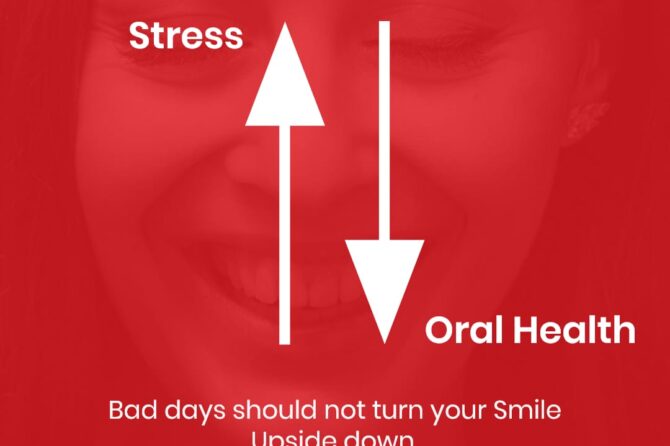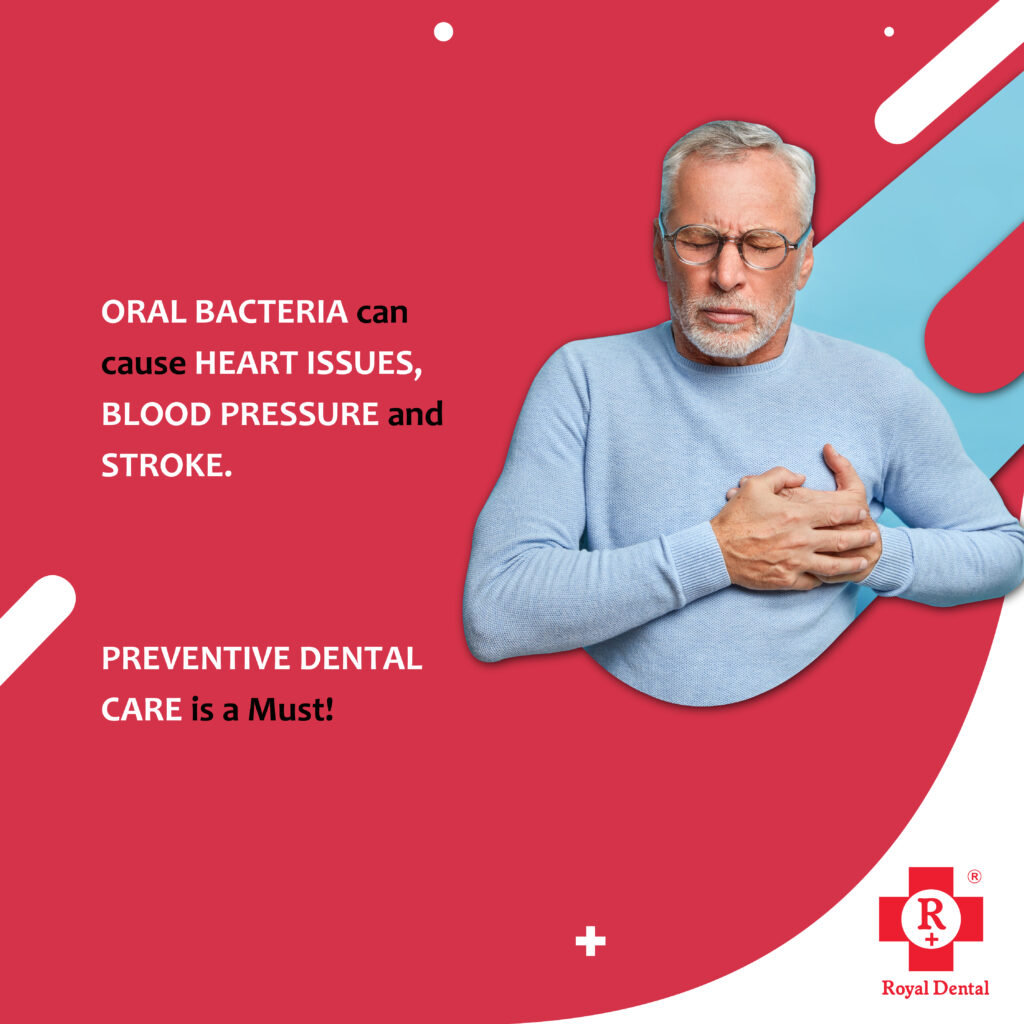
Link between General and Dental Health | Royal Dental
General and dental health are interrelated. Oral health is essential to general health and well being at every stage of life. Good oral and dental hygiene helps to prevent tooth decay, gum disease and bad breath. In contrast to this, poor oral hygiene increases the risk of systemic diseases such as cardiovascular diseases, low birth weight, bacterial pneumonia, diabetes, thyroid, AIDS, blood disorders. These diseases can lower the body resistance to infection making periodontal diseases more severe.
Bacteria from the mouth can cause infection in other parts of the body when the immune system has been compromised by diseases oro-medical treatment. Poor oral health can lead to risk for heart diseases .Inflamed gums causes periodontal diseases wherein the bacteria can get into the arteries causing the arteries to build up plaque and harden. This can lead to heart attacks ,stroke, poorly controlled diabetes and pre-term labour. Poor or fair oral hygiene can develop an oral infection with human papilloma virus which can eventually lead to cancer.
Dentist sees much more than just our teeth. Certain health related conditions show up in the oral cavity.
Diabetes
Diabetes and gum disease affect one another.Gum diseases intensify the complications associated with diabetes by increasing blood sugar level.High blood sugar levels are associated with pre mature degenerationof eyes,kidneys,blood vessels and nerves. It is also shown that people with diabetes face greater risks of developing oral infections and gum diseases than to those who do not have diabetes.Most common oral health problems associated with diabetes are tooth decay, dry mouth, gum disease, fungal infections, lesions in the mouth, taste impairment, infection and delayed healing.
Thyroid problems
Common oral findings in hypothyroidism include the charecteristics macroglossia(enlarged tongue), delayed tooth eruption, poor periodontal health, altered tooth morphology and delayed wound healing. Oral manifestations of hyperthyroidism include: susceptibility to caries, periodontal disease, enlargement of extra glandular thyroid tissue which is mainly in lateral posterior tongue, maxillary or mandibular osteoporosis ,accelerated dental eruptions and burning mouth syndrome.
Iron deficiency anaemia
Common symptom of anaemia is paleness in the gums which take on a faded or even whiter shades of normal color. This paleness can also affect tongue, and mucous membrane inside the mouth. Effect of anaemia on oral tissues include pain in tongue, paleness of tongue, swollen tongue or glossitis.
AIDS
HIV virus causes acquired immunodeficiency syndrome. Patients are at special risk for oral health problems. These include chronic dry mouth, gingivitis, bone loss around teeth, canker sores, oral warts, fever blisters, oral candidiasis (thrush) ,hairy leukoplakia and dental caries.
It is important to keep your dentist up to date on your health and medications. A dentist has the skill and the expertise not only to treat oral health diseases but to help with all oral health needs. Dental procedures involving bleeding of the gums require healthy blood clotting for recovery. Conditions such as liver disease and medications such as aspirin may affect the ability of blood to clot normally.
Heart
Patients with gum conditions such as periodontitis have the highest risk for heart disease. The pathogens associated with gum infection are in the mouth and can enter the blood stream where they get attached to the blood vessels and thus increase the risk of cardiovascular disease.
GI disorders
Due to increase in acidic levels there are erosions and cervical abrasion on teeth causing teeth sensitivity. In turn if there are missing or malaligned teeth chewing efficacy is hampered leading to digestive problems.
In today’s world stress has become part of our lives. Stress can have an impact on oral health in a number of ways. As forces that had the potential to challenge the adaptive capacity of the organism.
Bruxism: Night grinding of teeth and /or clenching of jaw is called bruxism it is usually done unconsciously during sleep most commonly. Various studies suggest that stress can cause night grinding of teeth, this leads to attrition of teeth in some cases it may lead to crack or fracture of teeth . In severe cases it may lead to Temopor-mandibular joint (TMJ) pain, muscle pain, pain relating to ears , face and upper and lower jaws.
Temoporo-mandibular disorders: these are characterized by joint pain, muscle pain and soreness due to tension in the muscles, when patients opens or close the jaw they experience pain at the TMJ. Stress is a contributing factor for temporo mandibular disorder. When a person is in muscles become taut or tensed. THIS is a reaction to stress. With the sudden onset of stress the muscle become tensed and then come back to their original position when stress is released . the muscle twitching or tension causes pain while opening or closing the jaw . some may also experience sensitive teeth
Oral Lichen planus: It is a Cronic inflammatory condition affecting oral mucous membrane it appears as white lacy straie along with redness and swelling. Most commonly seen on buccal mucosa or tongue. it is a reaction to stress.
General and Dental Health | Royal Dental
Ulcer: Stress can cause ulceration in the host immune response and leads to apthous ulcer. They comprise of small ulcers located on mucus membrane in the oral cavity. They appear as a red lesion with a while or yellow hallo on inside of the lips, cheeks, tongue, base of the gums. Symptoms include pain, burning sensation, inflammation, fever, difficulty in chewing. They are not contagious and heal within one to two weeks on its own.
Xerostomia: Dry mouth is called as xerostomia. Xerostomis is caused due to stress and side effects of few drugs used to treat conditions like parkinsons , depression, diabetes . Stress is one of the cause attributed to xerostomia.
Periodontal disease: Stress can cause neglect in oral hygiene, changes in dietary intake, decreased gingival circulation, alteration in salivary flow, lowered host resistance response, altered sleep. All of these has negative impact on the gingival tissues leading to periodontal disease.
Acute Narcotising Ulcerative Gingivitis (ANUG): Is a condition seen most commonly in patients with stress. It is characterized by decreased neutrophil count due to chemotosis and phagocytosis. So immunity is decreased. Body is unable to fight against bacteria or virus.
Cavities: Dry mouth causes cavities as the natural cleansing activity of saliva is hampered in xerostomia patients.



Leave a reply